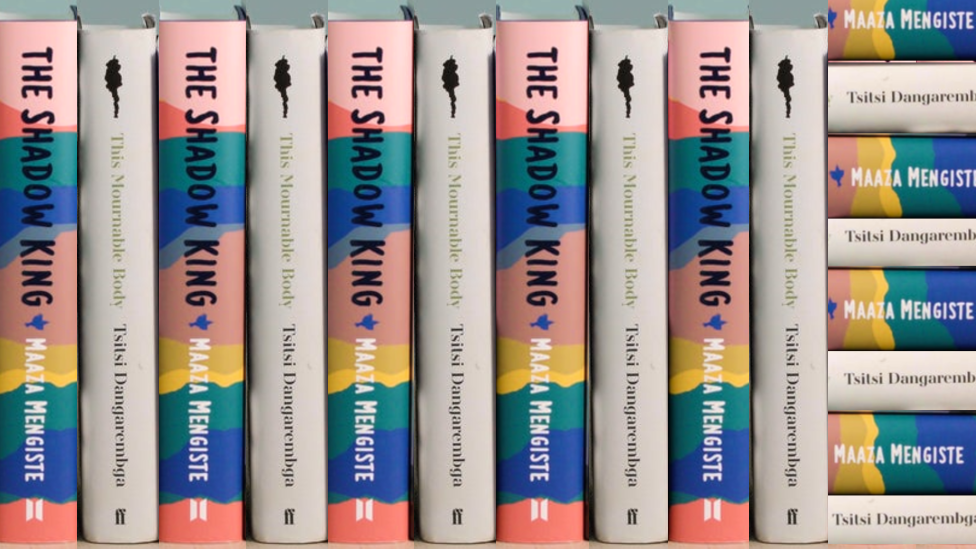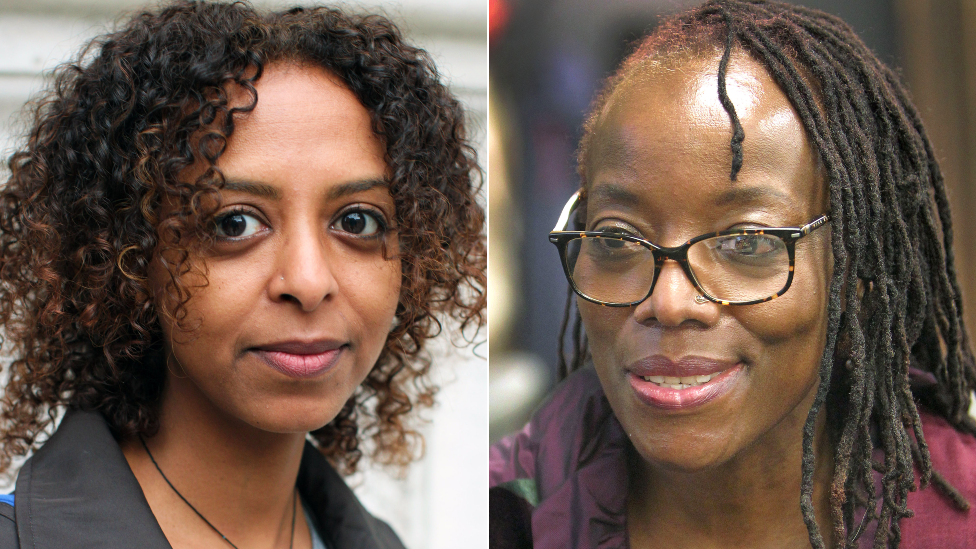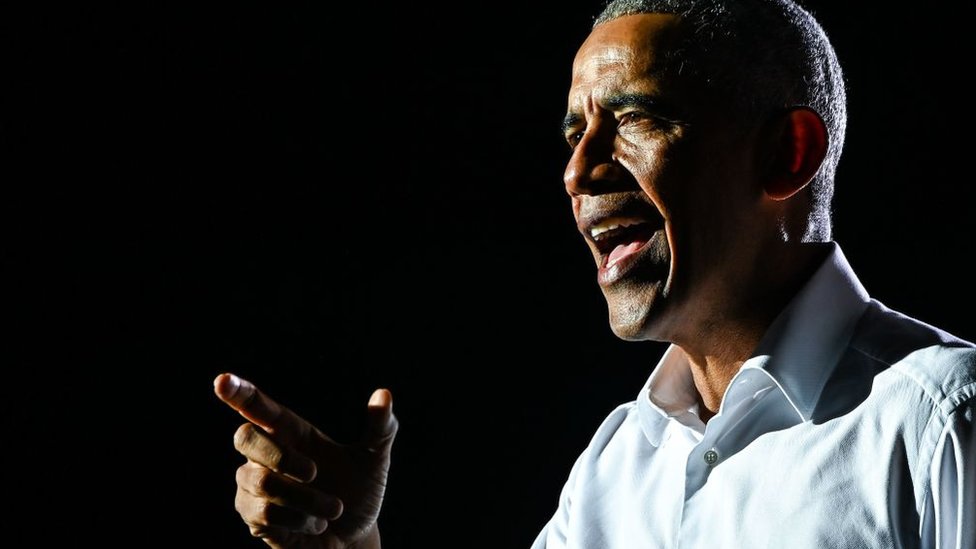Maaza Mengiste and Tsitsi Dangarembga’s shortlisting for a major prize is a boost for Africa’s literary scene.
Source: Africa basks in Booker boost for female writers – BBC News

Two African women are in the running for the 2020 Booker Prize, in a historic first for the UK’s most prestigious literary prize – and a major boost for storytellers on the continent.
News that Ethiopian-American Maaza Mengiste, author of The Shadow King, and Zimbabwean Tsitsi Dangarembga, with her novel This Mournable Body, were on the shortlist for the £50,000 ($66,000) award was received with celebration on the African literary scene.
“The fact that there are two Africans, there are three black people on this list, feels like this is a clarion call to the industry that it is possible to judge something fairly, not fall into tokenism, to judge a work for what it is. It feels like it sets a new path for the competitions,” Maaza said after the announcement that she was on the shortlist of six.
 IMAGE COPYRIGHTGETTY IMAGES
IMAGE COPYRIGHTGETTY IMAGES“I have often been the only African, the only black person, on a list; and this time it seems like the judges have thrown down a gauntlet and said that they will judge a book by what’s actually written, and not on the reputation of a writer or the reputation of the power they might have on the industry.”
Hard road to publication
Maaza and Dangarembga have both participated at perhaps the largest literary festival in Africa, the Ake Festival in Nigeria, which is a major draw for young writers and cash-strapped African publishers who no doubt wonder if they will ever make a breakthrough.
Dangarembga was a headliner at Ake in 2019 and during my onstage conversation with her, the audience was shocked to learn that the Zimbabwean author has had her fair share of literary adversity, despite the starry heights attained by her debut novel, Nervous Conditions.
Published in 1988, the novel won the Commonwealth Writers Prize for Africa the following year and was named one of Africa’s Best Books of the 20th Century, and made the BBC list of The 100 Stories That Shaped the World.
As actor Thandie Newton, whose mother was born in Zimbabwe, wrote in a social media post in August: “The first book I read when I arrived in Cambridge to study anthropology at the university was Nervous Conditions. It was a revelation.”

The sequel, The Book of Not, was published in 2006. This Mournable Body completes the trilogy, which follows the protagonist, Tambu, through pre and post-independence Zimbabwe.
As Dangarembga told the festival audience in Lagos last year: “The Tambudzai Trilogy examines the kind of extreme violence that you can trace from the top to the bottom and from the bottom to the top.”
With the title inspired by an essay by Nigerian-American writer Teju Cole in The New Yorker – Unmournable Bodies – the shortlisted novel had a hard road to publication.
“No-one was interested in This Mournable Body,” the author revealed. She was reduced to posting excerpts on Facebook, where it drew the attention of editor Ellah Wakatama Allfrey, whose intervention eventually led to the book’s publication, 30 years after Nervous Conditions.
“Up until now, I’ve been writing into the void. I didn’t have an agent. I didn’t know whether anyone was going to engage with what I was writing apart from a few close friends and colleagues who would read my work,” Dangarembga reflects.
Thanks to renewed attention, she now has an agent.
“I’m delighted. I am relieved that finally I get recognition that makes me feel that I have done something worthwhile with my writing.
“I just feel that I will be able to market the works that I’m doing better. And because I am not so anxious about it, the writing process itself is easier.”
The two shortlisted novels centre on African women, reinforcing the importance of stories about people’s experiences on the continent.
The Shadow King is Maaza’s second novel – her first, Beneath the Lion’s Gaze, was published in 2010 – and revisits the war caused by the invasion of Ethiopia by Benito Mussolini’s Italian troops in 1935.
Her use of photography in The Shadow King subverts the colonial photographer’s original intent, thus allowing hidden lives, hidden stories, to breathe again on the page.

“Mussolini understood the power of the camera and he took that to war, and I wanted to bring that into the book,” the author told the BBC Front Row programme earlier this month. She worked on the novel for 10 years, moving to Rome and learning Italian in order to research fascist archives.
The Fulbright scholar also drew on her personal history – her great-grandmother had enlisted for the war, taking along her father’s gun.
Conflict and corruption
Discussions around the novels and the Booker have also focused attention on the socio-political situations in the authors’ home countries.
With Ethiopia on the brink of another conflict – as clashes intensify in the country’s Tigray region – the historical war at the heart of the novel offers a commentary on current events in ways the author could not have foreseen.
In Dangarembga’s case, Booker recognition has helped highlight the author’s principled stand against corruption in her country.
Four days after the chair of the panel of judges, Margaret Busby, announced the longlist, and with the Booker spotlight on the author, the authorities in Zimbabwe arrested Dangarembga during a peaceful protest, in an astonishing set of circumstances Newton described as “painful and surreal”.
Later released on bail, Dangarembga began a cycle of court appearance after court appearance. Charges are still hanging over her head but she remains unbowed, winning the support of many.
In September she was announced the University of East Anglia International Chair of Creative Writing; and in October she delivered the 7th Annual Oliver Tambo Memorial Lecture.
The authors also welcomed their Booker nods for the potential impact on those coming behind.
“I do think that maybe it is inspiring for younger writers who are earlier in their careers, who realise that sometimes it doesn’t just happen all at once, that it takes time and you have to be dedicated and to really have a story you want to tell,” says Dangarembga.
 IMAGE COPYRIGHTAFP
IMAGE COPYRIGHTAFPFor Maaza “it is a confirmation of the talent that exists on the continent. It is letting African writers know that their work is noticed, it is being read”.
“And I hope that this encourages young writers to continue to work, to put the effort in, to not give up, and to understand that it is possible not only to be read in the West but what matters also is that these books get into Asia, into Africa, into different continents, and that’s happening.”
South African author and publisher Zukiswa Wanner says the shortlisting of the two books “is much-needed recognition of two excellent writers who lovers of literature from Africa have known to be excellent but the world may have underrated”.
On the day the shortlist came out, Wanner was pictured cradling both Dangarembga’s and Maaza’s books – an indication, perhaps, of the expectation riding on this year’s prize, which will be announced on Thursday.
“[It will be] a bonus for us all if one of them wins the prize – but if not, the shortlisting alone is a delight for us all,” she says.
And the Booker shortlist excitement on the continent should help stimulate the production of more stories about Africa, and hopefully more readers – especially with the news that Nigerian writer Chimamanda Ngozi Adichie’s novel Half of a Yellow Sun has been voted the best book to have won the Women’s Prize for Fiction in its 25-year history.
This can only be good news for African publishers struggling in poorly served infrastructural and business terrains.

Molara Wood is a writer and journalist based in Lagos, where she works as chief editor at Ouida Books.
COMMENTS